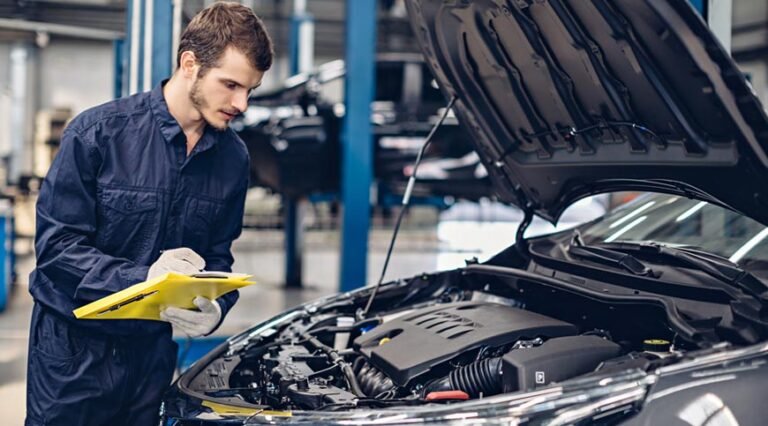Setting up your car for a long trip is fundamental to ensuring safety, comfort, and a hassle-free journey. A complete Car Inspection in Birmingham can help avoid sudden breakdowns and keep your car running smoothly throughout the trip.
Essential Pre-Trip Inspection
Check the Fluids
Engine Oil:
Ensure the engine oil is at the correct level, and consider changing it if it’s due. Fresh oil ensures better engine performance and longevity.
Coolant:
Check the coolant level and top it off if needed. Appropriate coolant levels avoid the engine from burning.
Brake Fluid:
Make sure the brake fluid level and top it up if needed. Sufficient brake fluid is fundamental for receptive braking.
Transmission Fluid:
Check the transmission fluid level and quality. Replace it if it appears dirty or has a burnt smell.
Windshield Washer Fluid:
Ensure the washer fluid reservoir is full to maintain clear visibility on the road.
Inspect the Tires
Tire Pressure:
Check the tyre pressure, including the spare tyre. Appropriately magnified tyres enhance fuel competence and management.
Tire Tread:
Examine the tyre tread for wear and tear. Replace any tyres with low tread depth to ensure adequate traction.
Alignment and Balance:
If you notice uneven tyre wear or the car pulling to one side, have the alignment and balance checked.
Test the Battery
Battery Charge:
Test the battery’s charge and ensure it’s holding a charge properly. If it’s more than three years old or showing indications of powerlessness, replace it.
Battery Terminals:
Check the battery terminals for deterioration and clean them if essential. Secure any loose connections.
Examine the Brakes
Brake Pads and Rotors:
Check the brake pads and rotors for wear. Replace them if they’re worn down to ensure effective braking.
Brake Lines:
Check the brake lines for any outflows or damage. Address any issues immediately to maintain braking performance.
Check the Lights
Headlights and Taillights:
Ensure all headlights, taillights, brake lights, and turn signals are functioning correctly, and replace any burned-out bulbs.
Interior Lights:
Verify that all interior lights are working properly to ensure visibility inside the car during night travel.
Test the HVAC System
Heating and Cooling:
Test the heating and cooling systems to ensure they’re working correctly. A functioning HVAC system is essential for comfort during the trip.
Defroster:
Make sure the defroster is working properly to maintain clear windows.
Additional Pre-Trip Preparations
Emergency Kit
Basic Tools:
Pack a basic toolkit with essential tools like screwdrivers, pliers, and a wrench set.
Spare Tire and Jack:
Ensure you have a spare tyre, jack, and lug wrench in case of a flat tyre.
First Aid Kit:
Include a first aid kit with bandages, antiseptics, and other medical supplies.
Emergency Supplies:
Pack emergency supplies like jumper cables, a flashlight, batteries, reflective triangles, and a fire extinguisher.

Navigation and Communication
GPS Device or Maps:
Certify your GPS device is modernised with the newest maps. Alternatively, carry physical maps as a backup.
Chargers:
Bring chargers for your phone and other electronic devices. Consider a portable power bank for emergencies.
Final Checks Before Departure
Test Drive
Short Drive:
Take the car for a short check drive to certify everything is working properly. Pay attention to any unusual noises or behaviours.
Braking and Steering:
Test the brakes and steering to certify they’re approachable and smooth.
Fuel Up
Full Tank:
Fill up the gas tank before you leave to avoid any interruptions during the initial part of your trip.
Fuel System Check:
Think through using a fuel system fresher to optimise engine performance.
Secure Your Load
Luggage:
Ensure all luggage is securely packed and doesn’t obstruct your view or movement.
Roof Rack:
If using a roof rack, make sure items are securely fastened and within the weight limits.
On the Road Tips
Regular Breaks
Rest Stops:
Take reliable breaks to stretch, rest, and pass up exhaustion.
Driver Rotation:
If possible, share driving duties with another licensed driver to stay alert and refreshed.
Monitor the Car
Gauge Checks:
Regularly check the dashboard gauges for any warning lights or unusual readings.
Listen for Issues:
Pay attention to any new noises or changes in the car’s behaviour.
Stay Alert
Focus:
Stay active, pay full focus on the road, and avoid distractions like mobile phones.
Weather Conditions:
Be ready for changing weather situations and modify your driving suitably.
Conclusion:
A comprehensive pre-trip Car Inspection and proper planning can significantly improve the safety and enjoyment of a long journey. By checking your car’s basic systems and factors, packing needed supplies, and staying aware on the road, you can avoid the most common issues and handle any surprising situations with comfort. Taking these steps will help you start your trip with confidence and peace of mind.

